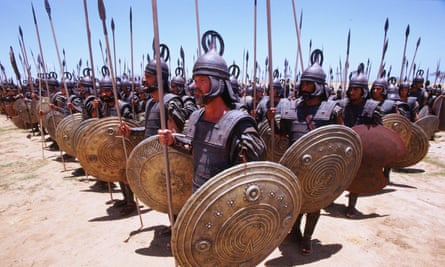Back in the 1950s and 60s in the twilight of Hollywood’s golden era, the sword-and-sandals movie stood as tall as the Colossus of Rhodes. It was a time when burly men in togas and gleaming bronze breastplates fought existential battles with fate. When Ben-Hur had its chariot race, Spartacus roused cries of defiance and the odd moment of splendid anachronism, and Cleopatra had Elizabeth Taylor burning through costume changes like a pharaoh with an Amex card.
And then, it all collapsed. By the 1970s, audiences weren’t interested in ancient glories any more; they wanted Vietnam war movies, paranoid political thrillers and antiheroes who didn’t spend half their films glistening in olive oil. By the time Star Wars arrived in the late 70s and early 80s, the genre had been survived only through low-rent Italian productions, where togas were optional but bad dubbing was essential, and the occasional made-for-TV slog where the biggest battles were against budget constraints.
Yet something about those dusty glories means Hollywood has never quite been able to let go. Clash of the Titans kept the flag flying for juddery, Ray Harryhausen-fuelled ancient fantasy spectacle in the 1980s, while the early 00s witnessed a slew of old-fashioned epics, from the sublime (Ridley Scott’s Gladiator) to the ridiculous (Wolfgang Petersen’s coarse Troy and Oliver Stone’s tedious Alexander). Since then we’ve had pathetic efforts to ride the 3D chariot all the way to Mount Olympus, in the form of the god-awful 2010 Clash of the Titans remake (and its even more terrible sequel, 2012’s Wrath of the Titans), along with numerous instantly forgettable fantasy flicks such as Immortals (2011), which resembled a perfume ad, and Gods of Egypt (2016), a film so bafflingly cast and painfully artificial it felt like a PlayStation 2 cutscene narrated by a confused history teacher.
But, in an era that has seen Dune go from a nerd punchline to the sci-fi fantasy event of the decade, the fact that Christopher Nolan is about to adapt Homer’s Odyssey is welcome news. Is this a sign that the sirens of prestige cinema might have lured Hollywood back toward ancient epics, or is it just another ambitious epic to be sunk by modern audiences who prefer their heroes in spandex rather than tunics?

The difference is in the film-maker. Nolan is the director who made Batman so self-serious and gloomily operatic that nobody else will ever be able to have fun with the Caped Crusader again. He is also the auteur who pulled off a synapse-twisting, acid-trip heist movie inside Cillian Murphy’s brain and the visionary who turned the birth of the nuclear age into a three-hour existential box office smash. There is nobody else out there, with the possible exception of Denis Villeneuve and (in his day) Scott, who can combine technically flawless cinema with blockbuster bombast. The last time we saw this kind of fusion of high-minded craft and crowd-pleasing spectacle, we got Peter Jackson’s Lord of the Rings trilogy.
But will today’s audiences really be ready to embrace the grandeur of antiquity once more? For all its prestige trappings, The Odyssey is still, at its core, a story about a bloke who spends 20 years getting lost at sea while trying to return to his wife. Is Nolan primed and ready to revive the swords and sandals genre? Or will this be just another sacrifice on the altar of cinematic overreach, doomed to sink beneath the waves like the lost city of Atlantis, Russell Crowe’s singing career and that Ben-Hur remake nobody watched?
Given the Oscar-winning director’s back catalogue, there is every chance this could be a triumph as mythic as its story. Let’s hope it is, because almost every other recent effort to return to the dusty source of the genre’s heyday has looked more like the cinematic equivalent of Sisyphus pushing Gods of Egypt back up the hill.
Source: theguardian.com


